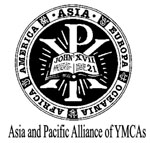|
Also, Duncan Chowdhury explained the seventeen (17) Sustainable Developmental Goals (SDGs) but focused on Goal 13- Climate Action and how it relates to tourism. He mentioned the 5 P’s- People (supporting the local entrepreneur), Planet (climate protection), Prosperity (benefit from the local), Peace, and Partnership- which are necessary for sustainable and responsible tourism. Patcharin Aviphan, director of Sao Hin YMCA Chiangmai, Thailand introduced the concept of water footprint to the participants. She explained how scarce water resource is and gave ways on how people, on a personal level, through lifestyle and conscious choices could conserve water.
All inputs, lectures, and information given served as an inspiration and an eye opener to be more conscious, sensitive and aware as a young person. Aside from the lecture, there was also a community exposure where participants visited the Espace Park, a community park, which was developed by Daegu YMCA. The different plants, flowers, and orphanage for the wild animals were introduced. But the highlight was the showcase of the Art Bike. It was made even more exciting when they were allowed to experience it. Similarly, the four-river project was introduced and it sparked an interesting, fruitful and meaningful discussion about the creation and effects of the damn in the ecosystem. As a result, they had a deeper appreciation on the importance of taking care of the rivers and the importance of considering the long-term effects of decisions.
The Regional Conference on Climate Change is a five-day capacity building program for YMCA youth leaders and change agents to be more climate aware and sensitive. On a personal note, I can say that attending such conference made me a better person. I became more passionate and fired up to implement my action plan in my local YMCA, and I am more challenged to take the lead.
In the end, a statement which is hope to serve as a manifestation of the desire to make climate action a key agenda in the APAY was created by the participants to take home and serve as a challenge for their respective YMCAs.
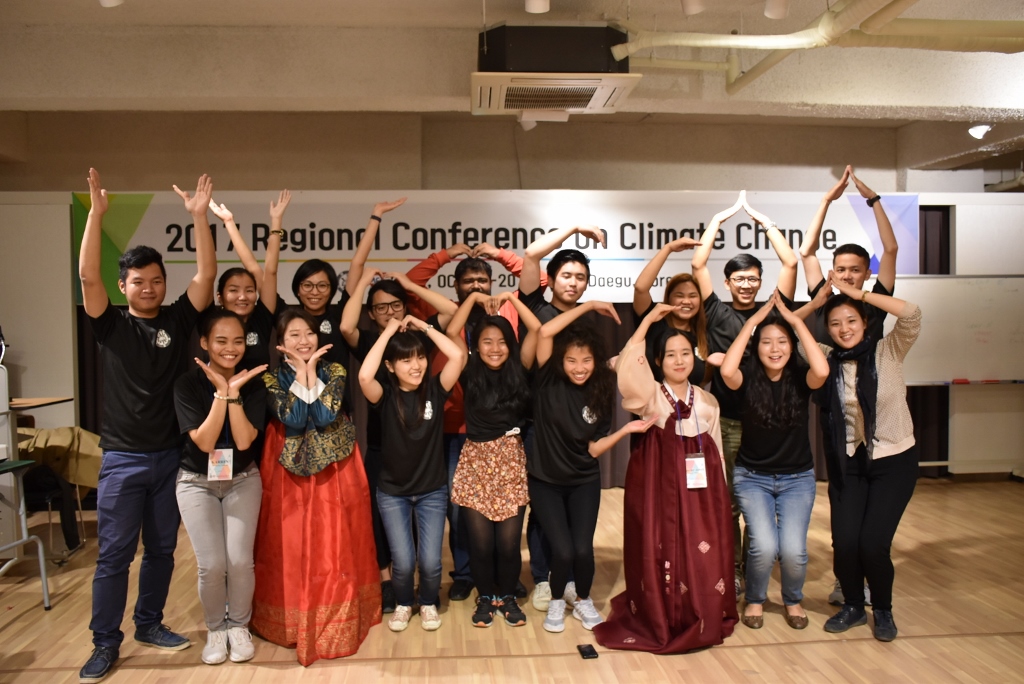 |
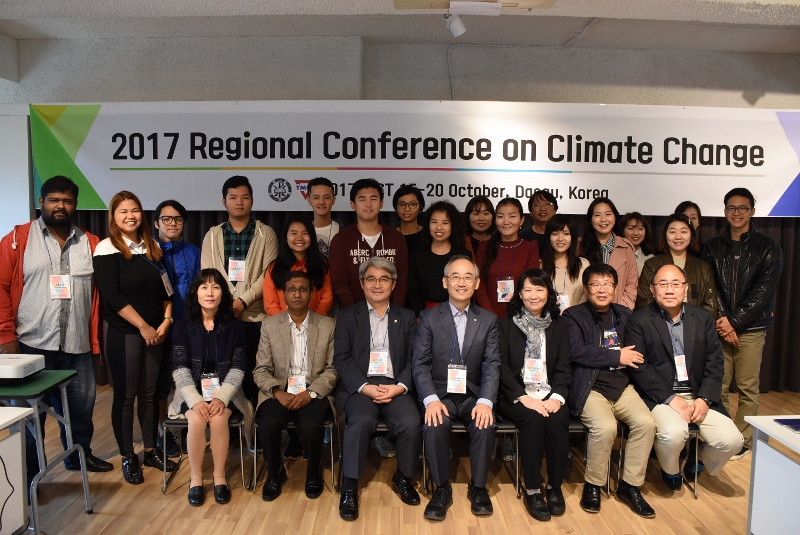 |
| ↑ YMCA youth on the last day of the conference |
↑ Participants of the Regional Conference held in YMCA of Daegu on 15-20 October 2017 |
~ CHERRY CAMILLE DEPANO, YMCA of the Philippines
Youth Statement on Climate Change
We, the sixteen young leaders and Change Agents/Youth Representatives from eight (8) different Asian countries namely Bangladesh, Cambodia, Japan, Korea, Myanmar, Mongolia, Taiwan, and the Philippines participated in the Regional Climate Change Conference held in Daegu, Korea hosted by the Asia and Pacific Alliance of YMCAs, the Global Alternative Tourism Network, and the YMCA of Daegu on October 16-20, 2017. Coming from different and diverse backgrounds, we gather with a common vision to be Climate sensitive and responsible individuals.
In the conference we learned more about the Paris Agreement and how Climate Change influences our lives. Issues linked to Climate Change particularly Gender Issues, Food and Water Security, Sustainable Development Goals and Tourism was discussed. Furthermore, the Water Footprint is a new concept that was introduced. During the exposure program, we realized that it is vital to deliberate all the sustainable impacts of our action and to consider not only the human perspective in decision making but all other living things as well.
Recognizing these things, we believe, is only one part of the solution. Taking actions is necessary to create positive impact on these issues. Hence, we have agreed that the following are our recommendations to combat climate change in our own lives, families, and communities: a) Waste Management and Recycling, b) Energy and Water Saving, c) Climate Education and Promotion, and d) Practicing an eco-friendly lifestyle (e.g. Meatless Monday and No Plastic Day).
Within our National Movements, we commit ourselves to do the following: a) Educating young people on environment and Climate Change, and b) Developing Green Team responsible for environmental management system in the organization (e.g. waste, water, and energy).
Finally, we recommend that the APAY, continue to promote educational awareness on Climate Change to national and local YMCAs. We encourage other young leaders in the movement around the world to use the E-learning on Environment and Climate Change especially in their youth empowerment programs. And lastly, we urge the YMCAs to initiate creative programs and projects on Climate Change and Environment.
In conclusion, we believe that Climate Change is a vital and pressing issue that needs more attention and commitment. The YMCA as a strong movement of young people should take the lead in transforming our discussions into actions, and we commit ourselves to this challenge together with the Asia and Pacific YMCA.
SOP learns that Reconciliation is Possible after Interreligious Conflict
On Oct. 15, SOP 2017 came to an end. The last week was busy with participants preparing and presenting their final reflective essays and also preparing for the closing ceremony. They departed Indonesia with many new experiences, knowledge and skills, and now their task is to determine how they will apply this to their communities. They have promised to keep us informed of their work after returning to their organizations and their work.
One very rewarding experience during the last couple of weeks was the opportunity to hear a presentation by Imam Muhammad Ashafa and Pastor James Wuye from Nigeria.
In 1992, violent interreligious conflict broke out in Nigeria’s Kaduna State. Christians and Muslims fought each other in the marketplace, destroying each other’s crops and attacking each other’s families. Both the imam and pastor were drawn into the fighting, and both paid a heavy price for their involvement—Imam Ashafa with the loss of two brothers and his teacher, Pastor James with the loss of his hand.
After this incident, they each dreamed of revenge against the other. Nonetheless, as leaders in their communities, the two men reluctantly agreed to meet. Imam Ashafa recalls what happened: “A mutual friend . . . took both of us by the hand and said, ‘The two of you can pull this nation together, or you can destroy it. Do something.’ ”
Over the next few years, through increasingly frequent meetings and separate religious epiphanies, the two men slowly built mutual respect and decided to work together to bridge the divide between their communities (from https://tanenbaum.org/peacemakers-in-action-network/meet-the-peacemakers/imam-muhammad-ashafa-pastor-james-wuye/).
Now they work tirelessly to build bridges between the Christian and Muslim communities. Their work has received international recognition, and they travel to many countries sharing their story and holding reconciliation workshops.
After hearing that they would be speaking at a university in Yogyakarta, the participants of SOP 2017 eagerly agreed to attend the meeting. Previously, they had watched a video telling the story and work of the two men, so they already had background information.
The mass media gives us so much negative information about the conflicts between people of different faiths, so it was very inspirational to listen to the imam and the pastor talk about their experience from their own religious perspectives. They prove that reconciliation is possible; and because of that, there is always hope.
The video is available on YouTube at <https://www.youtube.com/watch?v=kFh85K4NFv0>.
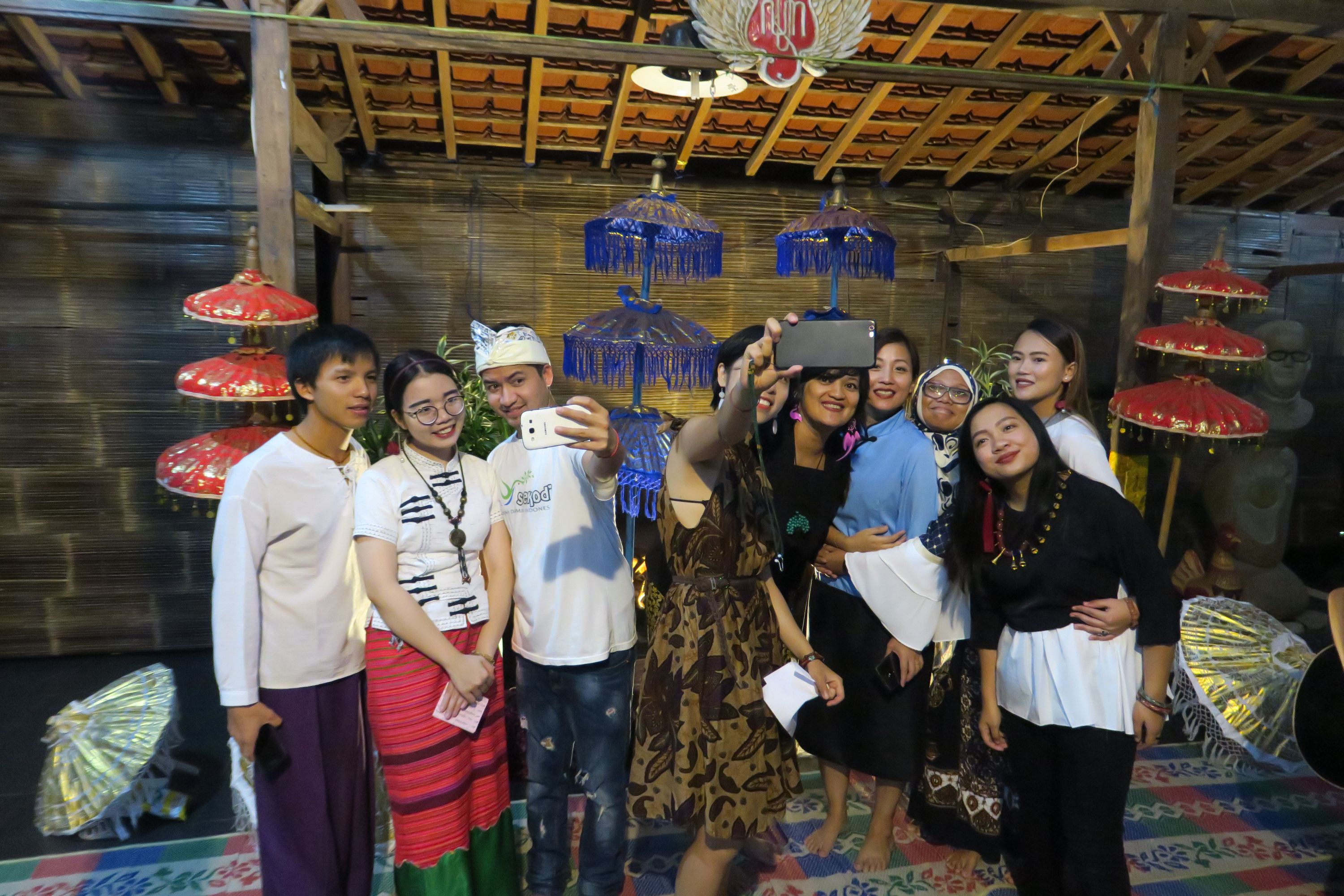 |
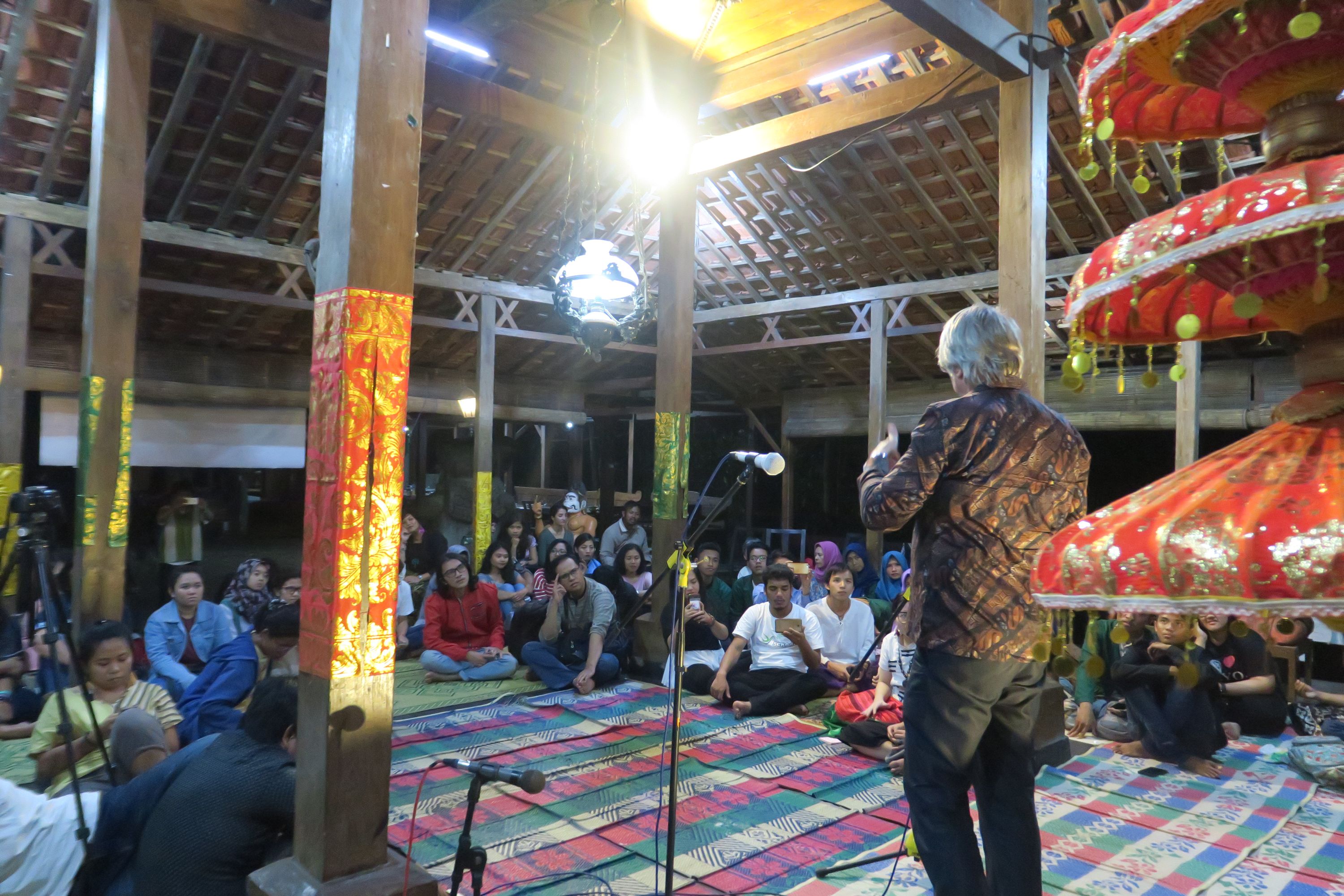 |
| ↑ SOP participants take one last selfie together at the closing ceremony
|
↑ ICF coordinator Max Ediger, right, offers his reflections at the closing ceremony
|
~ Max Ediger, Interfaith Cooperation Forum
GATN Basic Training in Luang Prabang
The YMCA of Luang Prabang (Organizing Committee) hosted the eighteen (18) participants from Chiang Mai YMCA, YMCA of Kuala Lumpur, and Taichung YMCA who joined the National Training Workshop led by Chan Beng Seng as Trainer / Resource Person.
This is a program of the Asia and Pacific Alliance of YMCAs (APAY) and the Global Alternative Tourism Network (GATN) held on 5-10 October 2017. It is an essential training platform for local YMCAs who are interested in developing, hosting and eventually sustaining their role as contributors in the alternative tourism industry. The training is devised by the APAY to deliver integrating parallels and strengthen local YMCA programmes while sustainably recapturing the income generation capacity and concentration of scaling community impact within the local YMCA.
The training started with a visit to two sample GATN sites- Ban Nayangtai which is known for its rare exquisite tapestries and cloth products made of silk cotton threads from rainforest cotton trees, and Ban Chan, a traditional tight-knit pottery village where participants learned not only about the process of making traditional pottery but also taking part in creation process itself, on traditional kick wheels.
During the training, participants were provided highly valued in-depth knowledge, best practices, case studies, productive arguments, beneficial statistics and expert opinions that were disseminated through both outdoor and indoor sessions. GATN Coordinator, Beng Seng introduced the participants on the new philosophies of Alternative and Responsible Tourism. In return, participants learned in full detail the root obligation of C.H.A.N.G.E (Community centered, Holistic approach, Advocating global citizenship, Nature and heritage conserving, Gender and child sensitive; and Economically viable) which thrives on accountability and stewardship.
The training also provided insights on the following issues:
- How dire implications of uncontrollable and irresponsible Tourism in some nations has caused not only manipulation against hosts, sites, vendors and local culture but also on how it augments harmful impact throughout outlier industries and sectors secondary to it.
- How to identify a more accurate disposition of Alternative and Responsible Tourism by designing local YMCAs GATN Programmes that fine-tunes focus on prioritizing community objectives and strengthening on social community impact while designing a more sustainable long-term methodology on making a profit for each GATN program.
- How from the case studies of Taichung YMCA as a Sending GATN and Chiang Mai YMCA as a Receiving GATN on the specific and specialized roles of both ends, to better flourish through community based tourism with greater attention on systematically designed stages of progress in parallel with the community objectives of the GATN Programme by first instilling greater emphasis on Thematic Learning, Service Learning and Work Camps.
- How to identify the moral spectrum of ethically promoting GATN Programmes with socially mindful non-profit marketing strategies so it will resonate deeply to suitable potential participants and sustain a more dynamic branding image for the local YMCAs involved.
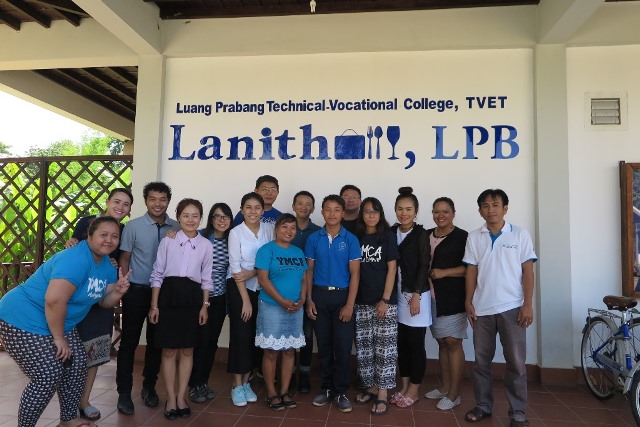 |
| ↑ Participants of the GATN Basic Training in Luang Prabang |
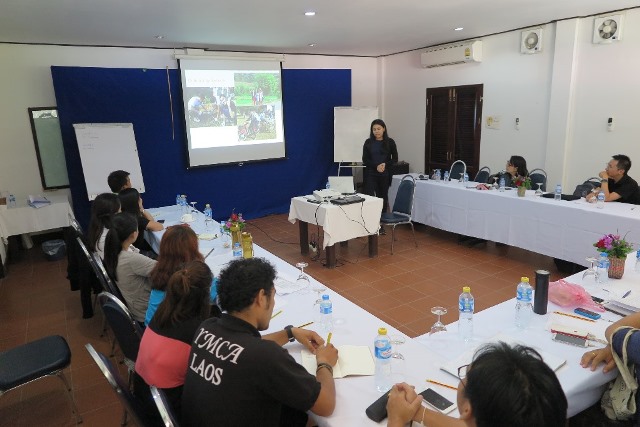 |
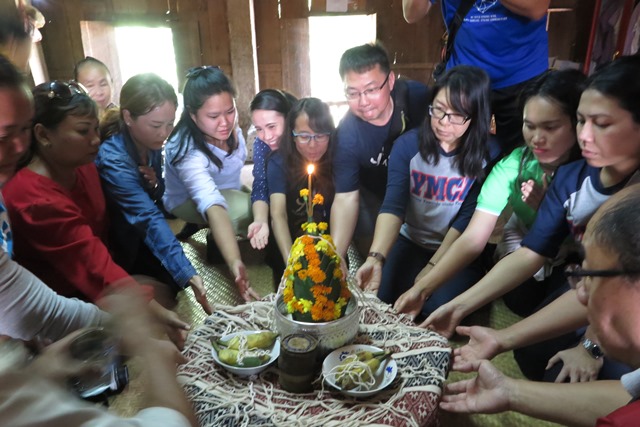 |
| ↑ Tidarat Penvijit discussing the service learning program of Chiangmai YMCA |
↑ A welcome ceremony held in one of the villages in Luang Prabang for the participant's visit |
The generous and homely hospitality provided by the YMCA of Luang Prabang (Organizing Committee) was warm and fun that every participant became fast friends, eventually sharing contact details with vows to come again. Luang Prabang has, during the GATN Training became a town that not only provided a profound contrast to most of the participants’ daily lives but gave them an opportunity to slow down their pace for a weekend to focus on what matters first in GATN Programmes- impact through CHANGE.
~ Genevieve Liza Menggu, YMCA of Kuala Lumpur
Japan YMCA Launches New Logo and Brand Concept
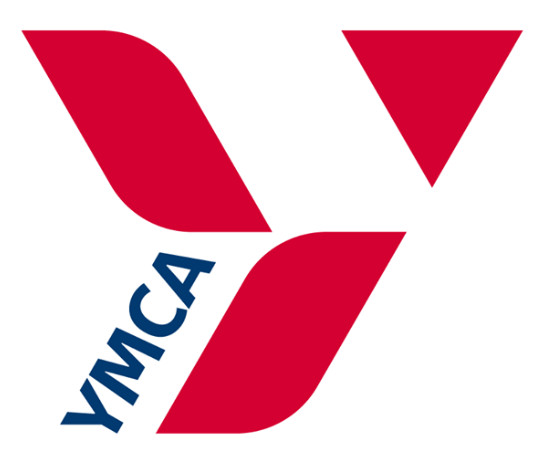 Japan YMCA celebrated the launching of their New Logo and Brand Concept on 1 October 2017. This was a concerted effort of 36 local YMCAs and 34 Student YMCAs together with 140,000 members to strengthen our movement and become more socially relevant. Japan YMCA celebrated the launching of their New Logo and Brand Concept on 1 October 2017. This was a concerted effort of 36 local YMCAs and 34 Student YMCAs together with 140,000 members to strengthen our movement and become more socially relevant.
The first YMCA in Japan was established in 1880 in Tokyo. Over the years, the movement rapidly spread throughout the country and the YMCA was recognized as a pioneer in many fields during the modernization of Japanese society. As the movement look to the future and aim to respond to the needs of Japanese society and the aspirations of communities, families and individuals, the Japanese YMCA has created a new logo and brand concept.
Japan YMCA named the national logo “Positive Y”. The new design merges the traditional YMCA Traingle into the motif of a bird soaring toward the future with vitality.
The new formulated vision of the Japan YMCA endeavors to build communities where people respect and enhance one another to bring out their best. The YMCA aim to inspire and enrich communities that are connected by people’s “Positive Net”.
“Positive Net” is Japan YMCA’s concept of building a network of good-willed, proactive people who respect individuality and bring out the best in one another. In a society full of challenging issues, people will confidently connect in such a way. Japan YMCA having a global network will strive to expand the “Positive Net” and build an inspiring and rich society.
“It is like a mustard grain, which at the time was sown in the ground was the tiniest of all the seeds on the earth. But when it has been sown, it grows and becomes greater that all other vegetable plants and produces greater branches, so that the birds of heaven are able to find lodging under its shadow” (Mark 4: 31-32)
“Lodging under its shadow” portrays the image of a safe space for all; especially children and youth. As Japan YMCA plant upon the new brand concept, the YMCA aims to nurture the Positive Net in the same way that a mustard tree provides lodging for birds, offering a precious space for youth to transform themselves to bring impact in the society and promote Peace.
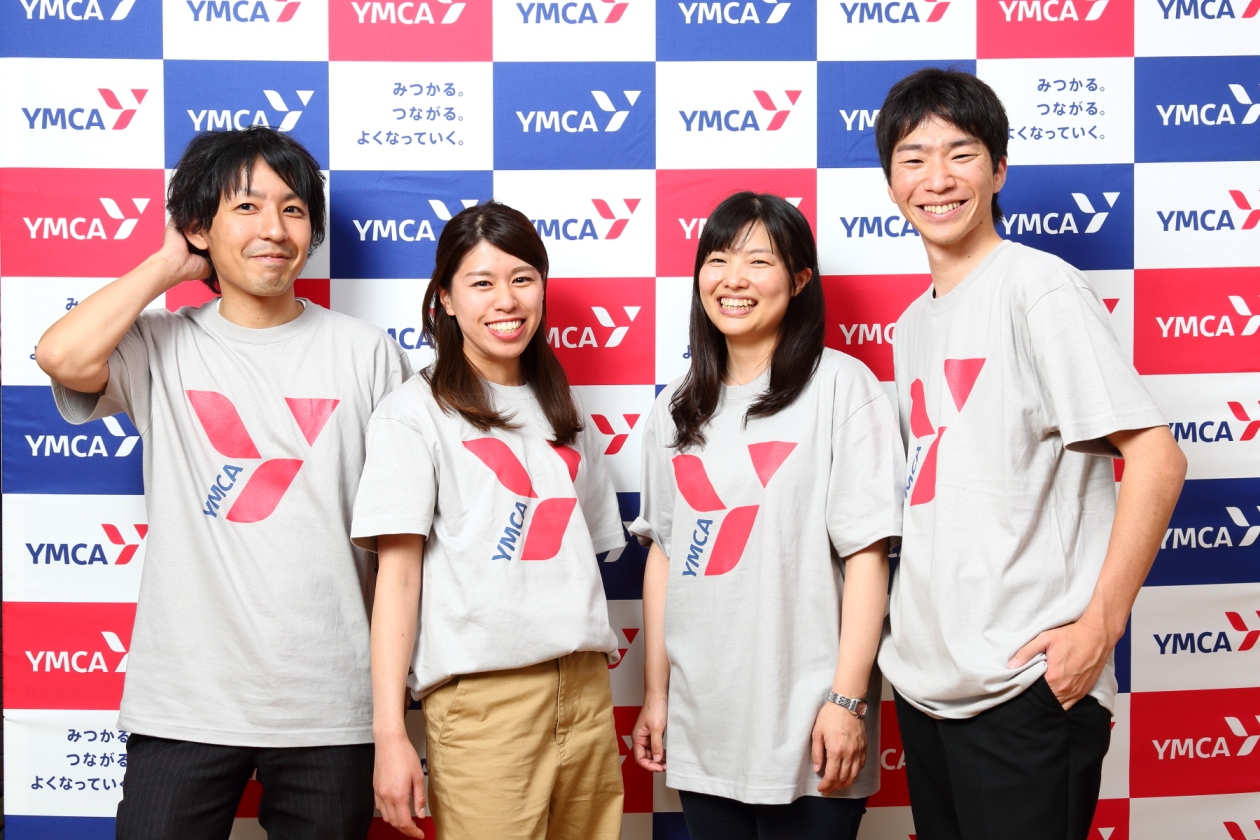
~ The National Council of YMCAs of Japan
APAY Executive Committee Meetings 2018
The next Executive Committee Meeting of Asia and Pacific Alliance of YMCAs will be held during 15th to 18th March 2018. The meeting will commence in the morning of 15th March and conclude by 12 noon on 18th March. All delegates are expected to arrive in the afternoon of 14th March and depart in the afternoon of 18th March or morning of 19th March.
The first Board Meeting of APAY will be held at 5.30 pm of 14th March and the adjourned meeting will be held in the afternoon of 18th March 2018 and conclude in the dinner. Board members are requested to book their tickets accordingly.
The first meeting of the 20th General Assembly Planning Committee will be held on 19th March from 9.00 am till 5.30 pm. Members of the GA Planning Committee are required to stay back on the 19th March and depart on 20th March 2018.
The APAY By-Laws were amended this year as such that the maximum number of each Standing Committee member was increased from 12 to 18. Therefore, we request the national/territorial movements to recommend more members to each Standing Committee. The deadline for the nomination of the Committee members is 30th November 2017.
During the ECM 2017, it was unanimously decided that all the national/territorial movements will make sure that at least one youth – volunteer or staff – will attend the ECM and YPLD Committee from 2018. The ECM will be a valuable venue for the youth to not only experience how the governance of APAY functions in a democratic and participatory manner but also train themselves as leaders and decision-makers. We urge all the movements to include at least ONE YOUTH in their ECM delegation next March.
|
